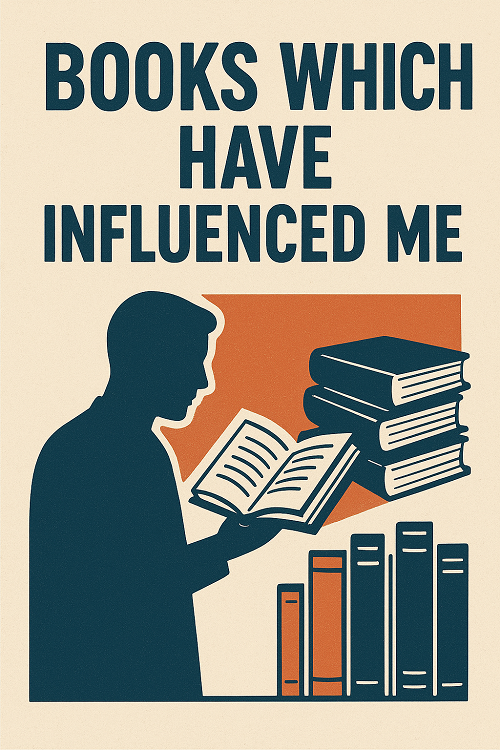There are, indeed, books and books; and there are books which,
as Lamb said, are not books at all. I have come across both the types-the
trashy as well the useful. Both have left their impress behind, but I shall
mention only those which influenced my mind for the better.
first book that I read twice and would be glad to read it a third time if
Looking back on the long vista of years I think Jane Eyre was the
Somebody presented it to me. I was, I think, fifteen when I first came
afectin and what appealed to me most in it was the adorable fidelity and
affection with which Charollete Bronte had written of children. The tragic childhood of Jane Eyre wrought upon me a certain charm of attraction as
well as compassion. It is generally said that the true tears are those which
are called forth by the beauty of poetry. But the true tears are also those,
of a yet rarer kind, which are called forth by the beauty of goodness and
of such goodness I had an overflowing abundance in Jane Eyre. Her hero,
Rochester, is a wonderful and incomparable figure. How she came first to
conceive and finally to fashion that perfect study of noble, faithful and
suffering manhood was and still is a puzzle to me.
The same year I came upon Jane Austen. I had long wished to
I write a novel in which, as mostly in life, nothing happens. And Jane
Austen, I found, had forestalled me there – though not quite. She gives
some mild shocks occasionally; her persons knock their heads together
now and then, and there are stars to be seen by somebody. But, taken on
the whole, her world squares well with the world that I had conjured up
for my novels which I still believe I shall write some day – and dip into
the well whereof Miss Austen has only skimmed the surface.
The next person in order of time was Shakespeare. He did not
impress me at that time. I am not ashamed to make this confession, for I
have now made amends and Shakespeare has been placed on the pedestal
he deserves. Macbeth was the first drama that fell into my hands. I was
horrified at the diabolical crimes and tried to seek refuge in All’s Well
That Ends Well lured by the title. I very soon concluded that the title was a
supremely cynical one. I detested Betram and was absolutely disgusted at
Helena falling in love with Paroles – that bragging coward. Shakespeare
was done for. I did not read anything more by him for a couple of years.
Having already read two or three abridged novels of Dickens, I
began to feel that I was qualified enough to approach the man in person.
And I think I did well in choosing David Copperfield as the medium of my
communion with that great mind. How closely Davy’s childhood
resembled mine, how I felt my heart go towards him and how I wept with
him and for him, I can never forget. He had lost his father and was bady
treated by his step-father. I had lost my mother and was similarly treated
by my step-mother. His mother was weak but always loving. My father
was weak (he is very strong now) and always loving. It seemed the
Dickens had really meant to paint me, but on second thought
introduced a few changes here and there so that I should not recognis
myself too easily. Micawber pleased me so much that as soon as I though
that I was going to read something about him, I used to laugh aloud so the I might not be interrupted by any fits of hilarity in the course of hearing
him speak.
Side by side with Dickens I came under the influence of Byron. I
had recently been discouraged in my love for Rehana and his Harlow and
Manfred with their burden of melancholy on them gave me comforts as
did the sulleness of his Laras. I kept repeating to myself:
My days are in the yellow leaf.
The fruits and flowers of love are gone
The worm, the canker and the grief
Are mine alone.
But that was only a temporary phase. As soon as I came over my
ill-advised infatuation for Rehana, I hated Byron, for I loved life.
Wordsworth, I thought, might give me solace. But his transcendentalism
and philosophies scared me away and I found comfort and an echo of my
heart in Shelley’s unbridled desires. How long I may continue under his
charm, I do not know. His idealism, his hope for mankind, his pursuit of
intellectual beauty, his sympathy for the woes of suffering humanity has an
increasing appeal for me.
By this time books of all kinds had gradually accumulated in my
little study and I was faced with the alternative of either evicting the
books or leaving them in sole, undisturbed tenancy and taking lodging else
where for myself.’ At last I determined to do to them what many people
do to rubbish – to make a bonfire of them. While I was consigning them
one by one to the devouring flames, I came upon a book that I would
never forget, for that little volume was to me a guide as well as an
entertainment. It was The Meditations of Marcus Aurelius. It is a book in a
class by itself. I wonder if I shall come across another of its kind. I am
glad I saved it from the flames.
